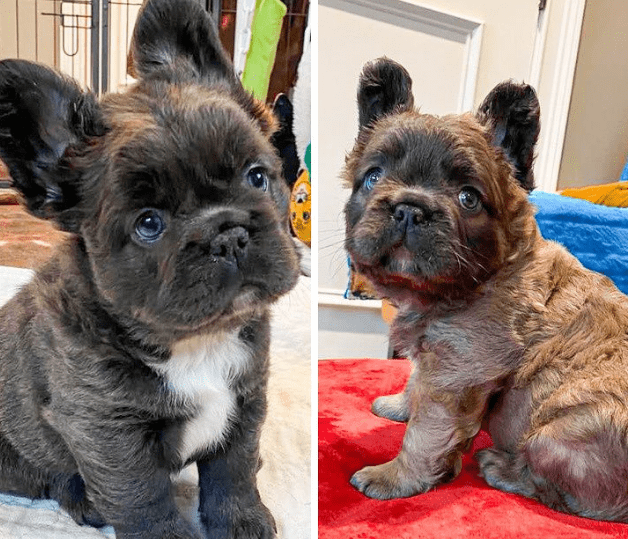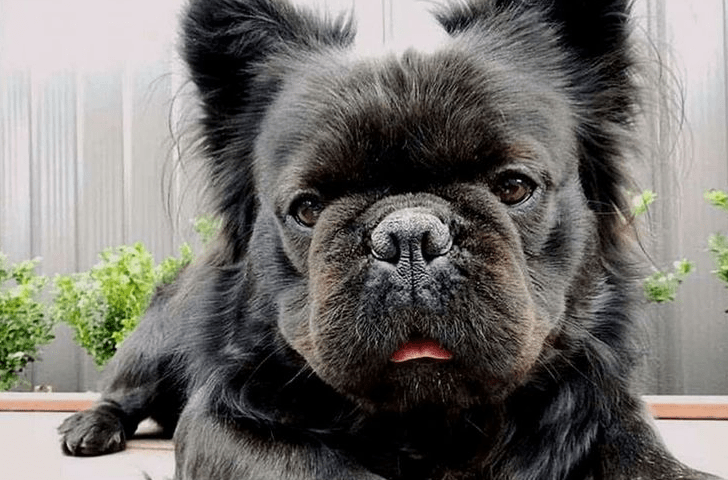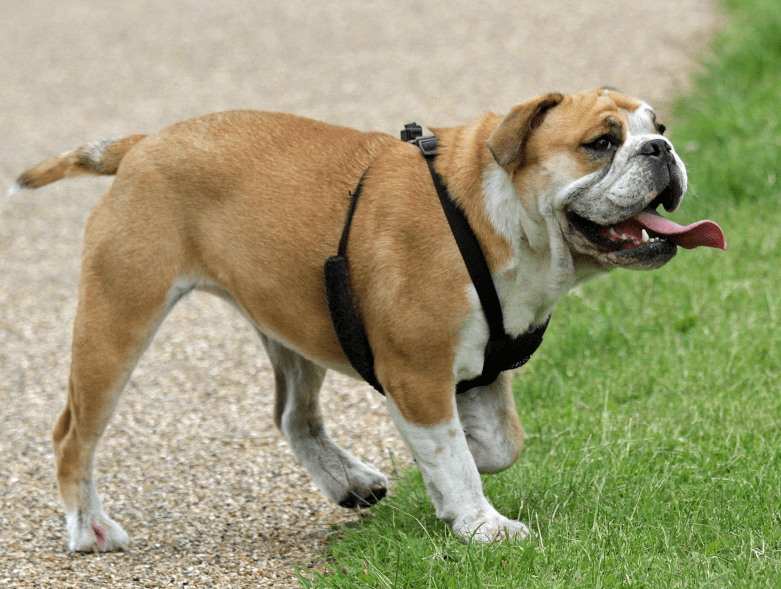The French Bulldog, also known as the “Frenchie,” is a beloved dog breed known for its unique bat-like ears, compact size, and affectionate personality. However, within the world of French Bulldogs, there exists a rare variation that has been gaining immense popularity: the Fluffy French Bulldog. Unlike the typical short-haired Frenchie, the Fluffy French Bulldog sports a longer, fluffier coat, giving it a distinct appearance that is both eye-catching and adorable.
What Is a Fluffy French Bulldog?
The Fluffy French Bulldog is a variation of the traditional French Bulldog, with one key difference: its long coat. This longer, fluffier fur is the result of a rare recessive gene known as the LH (long hair) gene. Both parent French Bulldogs must carry this gene for the puppies to have a fluffy coat, which makes these dogs relatively rare compared to their short-haired counterparts.
Despite their different appearance, Fluffy French Bulldogs are still considered purebred French Bulldogs. The American Kennel Club (AKC) does not disqualify them, but it’s important to note that they are not officially recognized for show purposes. Nevertheless, their uniqueness and undeniable cuteness make them highly sought after as pets.
Origins of the Fluffy French Bulldog
The French Bulldog, including the Fluffy French Bulldog, has its origins in 19th-century England, where lace workers in Nottingham bred small bulldogs for companionship. When many of these workers moved to France during the Industrial Revolution, they brought their dogs with them, and over time, the breed became known as the “French Bulldog.”
The Fluffy French Bulldog is not a separate breed but rather a genetic variation of the standard French Bulldog. The LH gene that causes the fluffy coat can be traced back to early French Bulldogs, though it became less common as breeders focused on the shorter coat that we associate with the breed today.

Physical Characteristics of the Fluffy French Bulldog
The Fluffy French Bulldog shares most of its physical traits with the standard French Bulldog, aside from its coat. Here are some of the defining features of this unique variation:
- Coat: As the name suggests, the standout feature of a Fluffy French Bulldog is its long, soft, and fluffy coat. The length and texture of the fur can vary, with some Fluffy French Bulldogs having a more wispy appearance, while others may have thicker, plush fur.
- Size: Like regular French Bulldogs, Fluffy French Bulldogs are small in size, typically weighing between 16 to 28 pounds and standing 11 to 13 inches tall at the shoulder. This compact size makes them ideal for apartment living or homes with limited space.
- Ears: Fluffy French Bulldogs have the same iconic bat-like ears that make the breed so recognizable. Their upright ears are large in proportion to their head, giving them an alert and curious look.
- Face: The face of a Fluffy French Bulldog is flat and brachycephalic, just like their short-haired cousins. They have a short muzzle, round eyes, and a pronounced forehead, giving them a somewhat squishy and adorable appearance.
- Tail: Fluffy French Bulldogs, like other French Bulldogs, typically have a short, straight, or screw tail.
Personality and Temperament
Fluffy French Bulldogs have the same charming personality that has made the French Bulldog one of the most popular dog breeds in the world. They are known for being affectionate, loyal, and playful, making them excellent companions for families, singles, and seniors alike. Here are some key personality traits of the Fluffy French Bulldog:
- Affectionate: Fluffy French Bulldogs are incredibly loving and thrive on human companionship. They are known to be “lap dogs” that enjoy cuddling with their owners and being close to the people they love.
- Playful: Despite their small size, Fluffy French Bulldogs have a playful nature. They enjoy short bursts of activity, whether it’s chasing a toy, playing with other dogs, or going on a brief walk.
- Easygoing: Fluffy French Bulldogs are generally laid-back dogs that adapt well to various living situations. They don’t require extensive exercise and are content to relax indoors, making them ideal for apartment dwellers.
- Social: This breed tends to be sociable with both humans and other animals. They usually get along well with other dogs, and their friendly disposition makes them great for households with multiple pets.
- Stubborn: Like their short-haired counterparts, Fluffy French Bulldogs can sometimes be a bit stubborn. This trait can make training a challenge, but with patience and positive reinforcement, they can learn basic commands and good behavior.
Care and Grooming of the Fluffy French Bulldog
Caring for a Fluffy French Bulldog involves a few additional steps compared to a regular Frenchie, primarily due to their longer coat. Here’s what you need to know about keeping your Fluffy French Bulldog healthy and well-groomed:
- Grooming: The long coat of a Fluffy French Bulldog requires regular brushing to prevent tangles and matting. Depending on the thickness of their fur, you may need to brush them several times a week. Additionally, their coat should be checked for dirt, debris, and parasites, especially after outdoor activities.
- Bathing: Regular baths are important to keep your Fluffy French Bulldog’s coat clean and free of allergens. Be sure to use a dog-specific shampoo that is gentle on their skin, as French Bulldogs can be prone to skin sensitivities.
- Ear Cleaning: The large, upright ears of the Fluffy French Bulldog can accumulate dirt and wax, so it’s essential to clean them regularly with a vet-approved ear cleaner.
- Wrinkle Care: Like other brachycephalic breeds, Fluffy French Bulldogs have facial wrinkles that need to be cleaned and dried regularly to prevent moisture buildup, which can lead to infections.
- Exercise: Fluffy French Bulldogs, like other Frenchies, don’t require intense exercise. A couple of short walks or play sessions each day are sufficient to keep them happy and healthy.
- Diet: Feeding your Fluffy French Bulldog a balanced and nutritious diet is crucial to their overall well-being. Be mindful of their calorie intake, as French Bulldogs can be prone to obesity due to their low-energy lifestyle.
Health Considerations
While Fluffy French Bulldogs are generally healthy, they do share some common health issues with their short-haired counterparts due to their brachycephalic nature. These health concerns include:
- Brachycephalic Airway Syndrome: Because of their flat faces, Fluffy French Bulldogs may experience breathing difficulties, especially in hot or humid weather. Owners should be cautious about overexertion and overheating.
- Hip Dysplasia: French Bulldogs, including the Fluffy variety, are prone to hip dysplasia, a condition where the hip joint doesn’t develop properly, leading to pain and mobility issues.
- Allergies: French Bulldogs are susceptible to skin allergies, which may be exacerbated in Fluffy French Bulldogs due to their longer fur. Regular grooming and monitoring of their skin health are important.
- Spinal Issues: French Bulldogs can also suffer from intervertebral disc disease (IVDD), a condition that affects the spine. Keeping your dog at a healthy weight and avoiding activities that could strain their back is essential.
Why Choose a Fluffy French Bulldog?
The Fluffy French Bulldog is an excellent choice for anyone looking for a small, affectionate, and unique dog. Their rare, fluffy coat sets them apart from other French Bulldogs, making them a conversation starter wherever they go. Despite their rarity, they retain all the lovable traits of the French Bulldog: loyalty, playfulness, and an easygoing nature.
For those who appreciate the compact size and personality of a French Bulldog but want something a little different, the Fluffy French Bulldog is the perfect fit. Whether you live in a small apartment or a larger home, this breed will adapt to your lifestyle and provide endless love and companionship.
Conclusion
The Fluffy French Bulldog is a rare and unique variation of the beloved French Bulldog breed. With their fluffy coats and affectionate personalities, they make wonderful pets for a wide variety of homes. While they do require a bit more grooming and care than their short-haired counterparts, the rewards of owning a Fluffy French Bulldog far outweigh the effort. If you’re looking for a loyal, playful, and irresistibly cute companion, the Fluffy French Bulldog might just be the perfect addition to your family.

